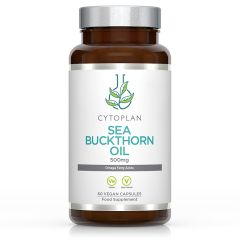Is sea buckthorn oil useful for menopause?
The sea buckthorn plant has been used to treat a wide variety of diseases in many cultures around the world for centuries. The oil from the berries of sea buckthorn contains a high level of nutritionally and medicinally important components. This nutritional powerhouse contains approximately 190 bioactive substances, including a unique mix of both saturated and unsaturated fatty acids, a range of vitamins and minerals , carotenoids, powerful antioxidants, flavonoids, phospholipids, anthocyanins and amino acids.
Of particular importance is the abundance of Omega-7 fatty acids; very uncommon within the plant kingdom and difficult to obtain through diet. Omega-7 is a primary component of the cells that make up the mucous membranes – found in the linings of the digestive and respiratory tracts, female genitalia and the inside of the eye. The high antioxidant levels in sea buckthorn oil, combined with its abundance of omega-7 fatty acids, play an important role in keeping the natural structure of mucous membranes hydrated and healthy by promoting tissue regeneration and reducing inflammation.
Sea Buckthorn oil can support those suffering with vaginal inflammatory atrophy (a thinning and drying of the vagina characterised by discomfort, feelings of dryness, burning and itching). Vaginal inflammatory atrophy affects up to 1 in 3 women, mainly during or after the menopause and is linked to low levels of oestrogen. Oestrogen is important for the structure of the urogenital area, where it maintains the elasticity and moisture of the epithelial barrier, but sea buckthorn oil appears to reduce symptoms and improve vaginal health, without increasing circulating oestrogen levels – so could be an alternative treatment where hormonal therapy is inappropriate.
Supplementing with phytoestrogens such as soy isoflavones has also demonstrated improvements in the symptoms of vaginal dryness and it is also important to consider the vaginal microbiome, which has been shown to have a profound effect on vaginal atrophy and dryness post menopause. Healthy vaginal microbiomes are dominated by Lactobacillus species and supplementing with probiotics rich in these strains has been shown to support vaginal homeostasis following menopause.







